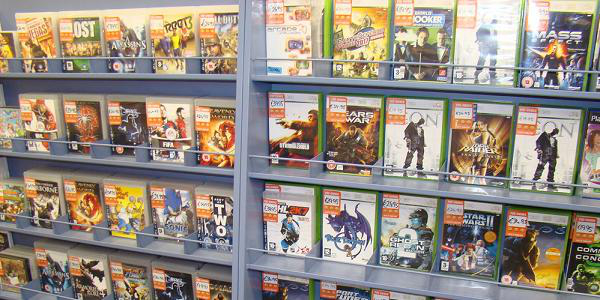It’s not often that I like to express myself on rumors; with that being said, this one has floated around for a while: the elimination of used games. Now before you go grabbing your pitchforks and go on a witch hunt (keep them at arms reach though), this has not been confirmed by either Sony or Microsoft that it’s true.
As mentioned in our previous article, the information released by Edge-Online is said to come from “sources with first-hand experience of Microsoft’s next generation console.” Since hearing this news I’ve brainstormed about the implications of what this could truly mean.

First, the only good thing I can really gather out of this is that the developers and publishers will actually make additional money from the games they work so hard to make. When I say this, I’m not really referring to the big name companies such as EA and Activision, because bigger name companies can afford to take a chance every once in a while with a new IP and count on the success of existing IPs to make bank for them. However, some of the smaller companies, like Vigil Games (see Darksiders), that truly rely on the income of the games that they make, and any lost sales could be potentially devastating to their bottom line. Even so, therein lies the problem: it’s only justifiable if everyone that plays games buys into this whole “no used games” philosophy. Which I know won’t happen.
The Xbox fan base is already raging about changing to Sony’s next console, but Sony is also looking into this possibility of a no used game future as well–but supposedly that rumor has been debunked. Many gamers are looking to jump ship without the confirmed facts from Microsoft and Sony. But before you do that, let’s see what either company has to say before final judgement is inflicted.
In truth, this rumor is hopefully just that: a rumor. I don’t see how Microsoft can justify to Gamestop to sell their console if they are taking away their main source of profit. Even just the mention of this block of second-hand games has dropped the stock of GameStop. But one has to wonder if the reasoning for the 500-600 stores being shutdown by Gamestop isn’t just a tell-tale sign of what’s to come.
One major disadvantage for this is most people can’t afford a new game every time one releases. I won’t lie, I buy used games sometimes but I try to buy them new more often than not especially when it comes to certain companies. I can justify buying a game from Bethedsa, Rockstar, Bioware, etc., because I know I’ll get my money’s worth out of the game. But when it comes to something like Madden, NCAA Football, or any other game like that I can’t justify it, especially when I know less than a year from now it’s going to be at least half the price because the “newer, better version of next year” will be coming out. So I’m going to pay $60 (speculated price) for Madden 14 then have Madden 15 come out the next year and see the servers kicked offline for Madden 14? I would be left with a game that I can’t play online nor trade in to salvage some of my money This is not the way to go Microsoft.
Next, in order for this whole used game ban to even work they will introduce an “online only” policy that makes Xbox Live an “integral” part of the next Xbox instead of an “optional” feature. So, you’re telling me that of the 70 million consoles sold–and only 40+ million have Xbox Live–the other 30 million won’t even be able to play the next console unless they upgrade? I can’t see this happening. That’s at minimum, 30 million customers that Microsoft would lose. Not to mention everyone who jumps ship because of the used game ban. Are they really willing to lose that many customers?

Also, by doing this Microsoft would eliminate thousands of jobs from companies such as GameStop, Gamefly, and other stores that sell used games. Where exactly are they going to sell their hardware if they eliminate their main suppliers? The source from Edge-Online also claims that discs will “have no function beyond the initial users.” There is a code that will come boxed with a new copy of the game for you to input, online, when you put the game in your console for the first time and only your account will be able to play that game.
Without confirmation, I can only speculate as to how it’s going to work on the next Xbox–but let’s take this into consideration: Say that, for instance, my daughter and I want to play the next-gen Skylanders game (you know it’s coming) on the next Xbox. How exactly is split-screen/same screen co-op going to work? Are they going to force us to buy two copies of the game and two Xboxs to play the same game together? Or are they going to just cut out “same screen” feature out of the picture? Unless it works the way purchasing Xbox Live Arcade games does, then I don’t see how this is even a possibility.
I speak for myself and these are not the views from the rest of the staff here at Broken Joysticks, but if Microsoft wants to put themselves out of the console business, then yes, this is the way to go. I’m a huge Microsoft fan (a fanboy as some would say); I own a Windows 7 Phone, Windows 8 Phone, Windows 8 on my PC, 3 Xbox 360’s, and plan on getting a Surface tablet. I wont go as radical as some people have been, stating that they “will never buy the next Xbox if this happens”, because I know that will be a lie. I will purchase one regardless because I’ve invested too much into this already but I can guarantee that my game purchases will be limited to games that I know 100% I will enjoy instead of taking chances on pay full prices for games that I may or may not like such as Venetica, Just Cause, Two Worlds, etc.
In the end if this is the direction that Microsoft pursues, I think it will be their ultimate failure as a company unless they find a way to allow the used game market to exist by purchasing game unlock codes from retailers such as GameStop. I think that the developers and publishers deserve to see the fruits of their labor, but I also think this is a very fine line that has to be treaded with the utmost care. Not only for the sake of the consumers and retailers, but for the entire gaming business.
